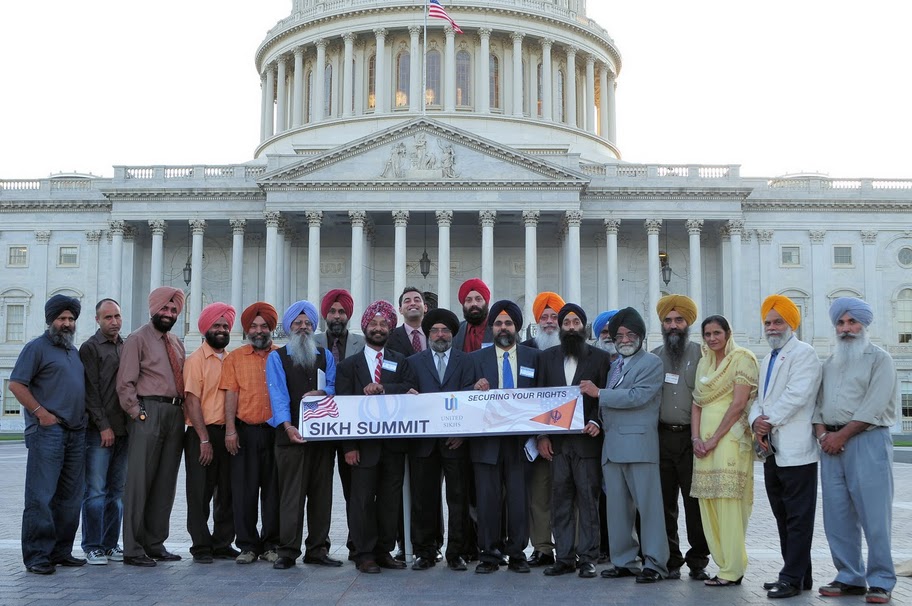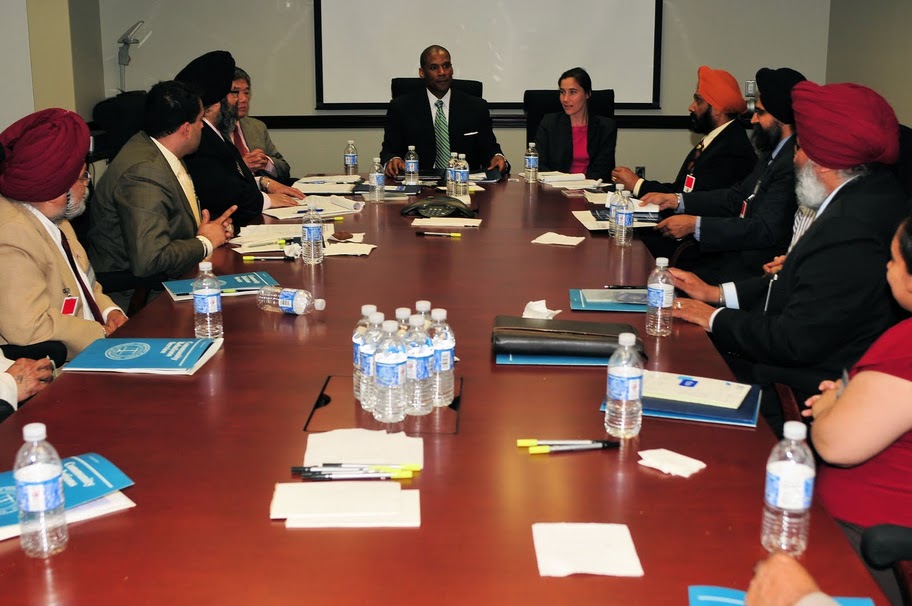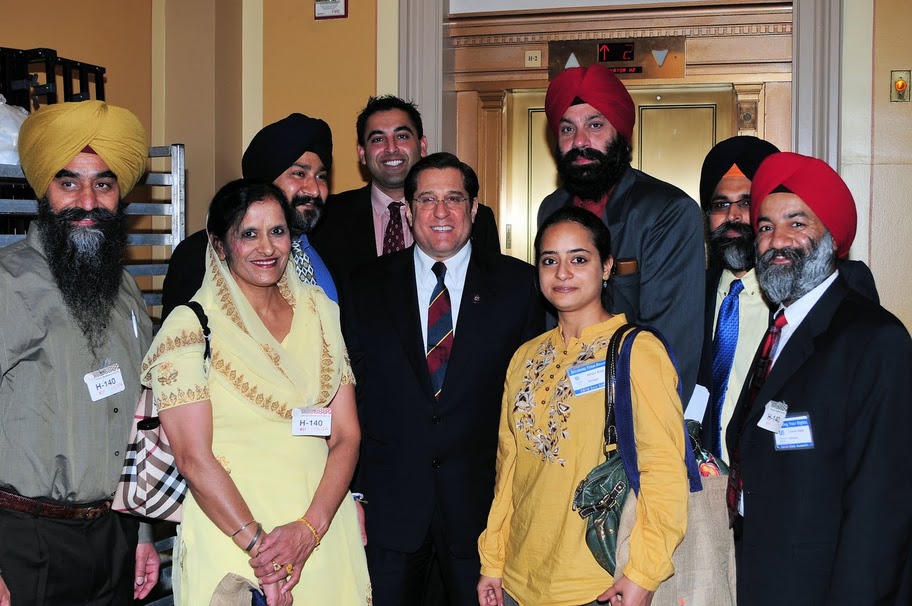|
Washington,
DC:
In a week long series of meetings with lawmakers, Sikh organizations
and community leaders engaged United States Senators and Members of
Congress in a dialogue about issues that most affect Sikhs in the
country. The 2010 Sikh Summit was organized by UNITED SIKHS as part of
their ongoing advocacy projects to protect Sikh civil and human rights.
Issues presented to legislators included Hate and Bias Crimes, Verbal
Harassment, and General Xenophobia, Department of Homeland Security,
Customs and Border Protection: Misidentification and Watch-list Issues,
Employment Discrimination, TSA and Photo-Identification Issues, a
Separate Count of Sikhs in Census, the safety of Sikhs in Pakistan, and
the Right to Turban in France and Belgium.
 |
2010 Sikh Summit Delegation |
The Sikh Summit was a way for leaders of the Sikh community and Sikh
organizations across the United States to gather on Capitol Hill and
express issues of the Sikh community to Senators, Congress persons and
members of government think-tanks. Sikh delegations were warmly
received by representatives who lent an attentive ear to the concerns
of the Sikh American community, and offered their support for issues
such as discriminatory practices during air travel, injustices faced in
form of xenophobia like hate crimes, bullying in schools etc, and
procuring a separate code for Sikhs in future Census and American
Community Surveys.
Issues related to Transportation Security Administration (TSA) like
Sikhs being singled out for additional screening or incorrectly
detained due to mistaken identity, watch list issues and lack of follow
up on redress procedures gained considerable support among lawmakers.
Congresswoman Zoe Lofgren sympathized with the plight of Sikhs
discriminated at airports and detained during international travel.
Congressman John Garamendi agreed that there is a training issue, and
lack of consistency in how these concerns are handled across airports.
Senator Kirsten Gillibrand’s office and Senator Joe Lieberman
shared the concern about arbitrary targeting for Sikhs in airports and
lack of due process on TRIP complaints, and have offered assistance in
furthering dialogue with TSA and Department of Homeland Security (DHS).
Another issue that garnered encouragement was counting of Sikhs in
Census. UNITED SIKHS is part of a nationwide campaign to receive a
separate code to count Sikhs in national surveys. As of now, Sikhs who
self-identify on the census form under “Some other
Race”
are automatically coded as Asian Indians with no way to disaggregate
data, and therefore no substantial numbers on the number of Sikhs in
the country. Congressman Xavier Becerra agrees that having a
disaggregated number is important to be able to provide adequate
services to the population, and Congresswoman Judy Chu’s
office
offered immediate assistance to get a separate code for Sikhs in
upcoming American Community Surveys. Congresswoman Yvette Clark
remarked she was “100% supportive of the issue.”
 |
 |
Sikhs with US DOJ CRS Officials |
Congressman Steve Rothman meets with the delegation |
| Click here to view other pictures from the Summit. |
Among delegates were representatives from California, Connecticut,
Georgia, Maryland, New Jersey, New York, Pennsylvania, Virginia,
Washington DC and Washington (State) who brought their own viewpoints
and concerns from their respective communities to discussions with
lawmakers from their own particular regions. Sahib Kaur, a college
student from Virginia, said, “Growing up in this country as
an
American, I would like to be part of the norm, than be the exception to
the rule.” Charanjit Kaur Chanana, an educator from
Connecticut,
stressed the importance of education and awareness to decrease bullying
in schools and increase cultural diversity.
The Sikh Summit was innovative in the way it brought together
law-makers, advocates, and most importantly, community members. Kuldip
Singh, UNITED SIKHS President particularly emphasized the role of the
community in advocating for issues that affect them the most. He said,
“It is now crucial for us to be our own advocates. Community
members have an important say in policy-making as constituents and as
Americans, and more Sikhs should give voice to specific matters that
impact their community.”
Delegates alluded to the long term impact of a multi-lateral effort
like the Sikh Summit on future generations. Narinder Singh Malik of
Georgia remarked, “We are an integral part of the American
society, and we collectively presented our Sikh issues for the benefit
of our youth.” Jasmeet Singh Jaspal from California echoed a
similar sentiment and said, “It was a humbling sight to see
Sikh
Americans speaking out for the concern of the community, vocalizing
local/national issues to government leaders and taking action for
ensuring a better future for generations to come.”
UNITED SIKHS Director Kashmir Singh is looking forward to working with
lawmakers and implementing solutions to Sikh civil rights concerns.
“Each lawmaker received a memorandum on Sikh issues, and we
have
made some recommendations on how to address these issues. We are hoping
to be able to continue our work with policymakers and community members
on how to translate these thoughts into action and be part of the
decision making process that affects our community.”
Dialogue generated from the Summit and the support from lawmakers on
Capitol Hill will form the foundation for proactively seeking and
implementing resolutions to Sikh concerns at a policy level, and will
be compiled in the 2010 Sikh Summit Report, which will be released
shortly.
To read a previous press release on the 2010 Sikh Summit, please visit:
https://unitedsikhs.org/PressReleases/PRSRLS-05-04-2010-00.html. Click
here
for the
2009 Global Sikh Civil Rights Report.
Issued
by:
Jaspreet Singh
Staff Attorney
UNITED SIKHS
888-243-1690
law-usa@unitedsikhs.org
|



